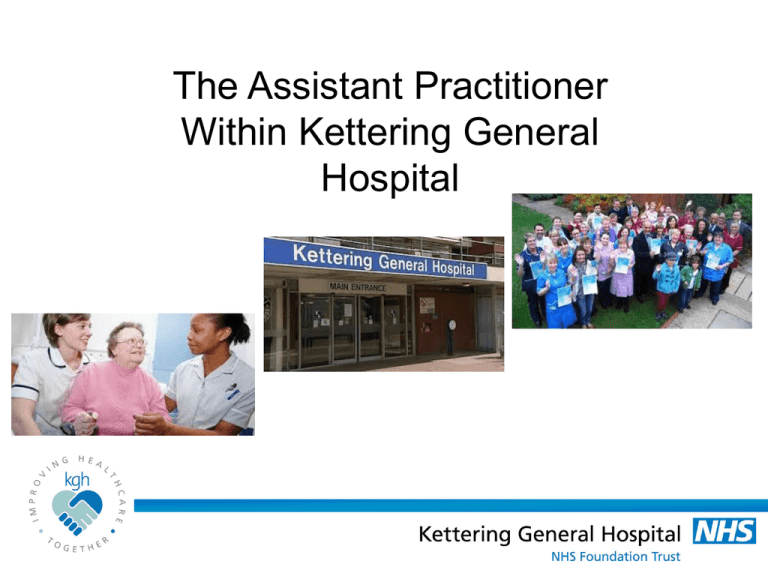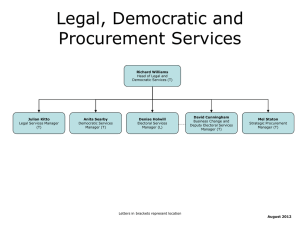Assistant Practitioner Presentation
advertisement

The Assistant Practitioner Within Kettering General Hospital History • The Assistant Practitioner role at Kettering General Hospital, evolved out of a national recognition that Nursing career pathways had to change to meet the needs of a rapidly changing patient demographic. • Increased demand upon services coupled with an aging workforce required creative solutions to ensure that we met our aims to deliver high standard care to our patients. • Led at a county level by Health Education East Midlands, the Assistant Practitioner role was a creative response to the increased demands upon healthcare providers (both financial and workload) to utilise their assets more effectively to be able to meet these demands. History • The first cohort of Assistant Practitioners commenced in 2010. • Over 30 Assistant Practitioners have been trained so far at Kettering General Hospital. • Attrition rates remain extremely low and it provides a cost effective way of developing our workforce. • The majority of the Assistant Practitioners who have completed their training are still employed within the Trust. • Becoming an established and valuable part of the Nursing and Midwifery workforce. • Assistant Practitioners now work in a variety of roles and settings including OPD, Wards and in the Cardiac Centre. Reflections from practice Jane Bull Assistant Practitioner Ashton Ward Why I chose to be an Assistant Practitioner My Journey UNIVERSITY AND TRAINING • • • • • Exhilarating Experience Academically Challenging Confidence Building Vital Support from Mentor/Ward Manager Clinical skills Assistant Practitioner role benefits • • • • Changes and impact on Ward Training benefits Holistic approach to patients AP role in the future Any questions? The value of the Assistant Practitioner • Has become a key part of the Nursing workforce within the Trust. • The AP role is well placed to be able to flex to meet changing demographics and the changing demand upon healthcare providers. • Expert unregistered practitioners, able to provide expertise and leadership within their environments. • Now embedded as part of our workforce development plan, the Assistant Practitioner role is a key part of our commitment to develop our unregistered nursing workforce. • As part of our Unregistered Nursing Careers Framework, the Assistant Practitioner role helps provide an achievable career pathway either as a role in its own right or leading on to professional registration. Our Vision • To continue to develop the Assistant Practitioner role within the Trust. • To continue to develop our existing Assistant Practitioners to meet the changing needs of our patients. • To create a robust and flexible pool of expertise able to flex and develop as the needs of service change. How are we achieving this? • Employment of a Clinical Development Facilitator to oversee education and development of the Unregistered Nursing workforce. • Assistant Practitioners being trained to be able to deliver simple medications in specific areas to help provide patient care more effectively. • Working with partner organisations to develop a comprehensive professional development framework and looking at how we can equip the Assistant Practitioner with more of the support skills that may be required in the future. • Developing Assistant Practitioners to be able to mentor, assess and support other Healthcare Support Workers, Trainee Assistant Practitioners and Clinical Apprentices. How are we achieving this? • Created a Trainee Assistant Practitioner and Assistant Practitioner Forum to allow through flow of ideas and feedback from practice. • Creation of Assistant Practitioner Open days to create increased awareness and understanding of the role. • Working with Department Managers to think creatively about how an Assistant Practitioner can benefit them and the needs of their service. Conclusion: The Assistant Practitioner role is now well established within Kettering General Hospital and remains a key part of the Nursing workforce. Now more than ever the role is well placed to be able to respond to the challenges that face the NHS within the coming years and remain at the forefront of innovative nursing practice.








